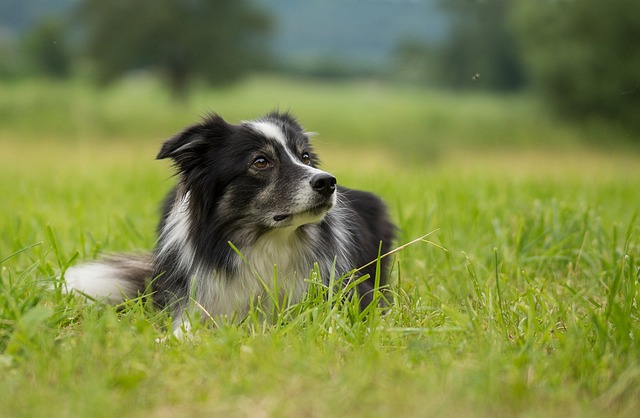
Are Border Collies good with chickens? They can be. Border collies have a natural herding instinct that may cause them to chase and even nip at smaller animals, such as chickens. However, with proper training and socialization, border collies can learn to coexist peacefully with chickens.
It is important to introduce the dog to the chickens slowly and under close supervision, rewarding positive behavior and correcting negative behavior. With patience and consistency, many border collies can learn to respect and protect their feathered friends.
Understanding Border Collies
While every dog is different, it is important to understand the breed characteristics of Border Collies before introducing them to chickens. These dogs are highly active and require a lot of exercise and mental stimulation. Without proper exercise and stimulation, they can become bored and destructive.
In addition to their exercise needs, Border Collies are also very intelligent and require mental stimulation. They thrive on learning new commands and tasks, and enjoy having a job to do. When introducing a Border Collie to chickens, it is important to provide them with plenty of mental stimulation to prevent them from becoming bored and potentially harming the chickens.
Border Collies and Livestock
Protective Capacity
Border Collies are also known for their protective capacity. They are loyal and dedicated to their owners and will do whatever it takes to keep them safe. They are very alert and will bark at anything they perceive as a threat. This makes them excellent watchdogs and guard dogs.
Herding Capacity
Border Collies are also highly skilled at herding. They have the ability to move livestock in a calm and controlled manner. They use their natural instincts to anticipate the movements of the animals and guide them where they need to go. This makes them an excellent choice for farmers and ranchers who need to move their herds from one place to another.
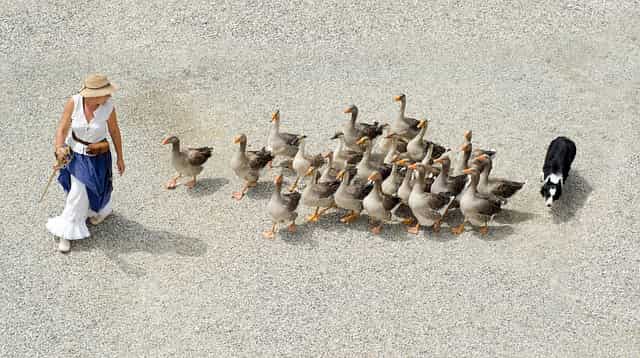
Training Border Collies with Chickens
Basic Commands
Training your border collie with chickens requires a strong foundation of basic commands. Commands such as “come,” “sit,” “stay,” “down,” “lead,” “to me,” and “away to me” are essential for creating a safe and controlled environment for your chickens.
Positive Reinforcement
Positive reinforcement is a key aspect of training your border collie with chickens. Rewarding your dog for good behavior, such as staying calm and not chasing the chickens, can help reinforce the desired behavior. Treats, praise, and playtime are all effective forms of positive reinforcement.
Socialization
Socializing your border collie with chickens is important for creating a positive relationship between the two. Introducing your dog to the chickens gradually and under supervision can help them learn to coexist peacefully. Patience and time are key when socializing your dog with chickens.
Border Collies as Farm Dogs
Predator Control
One of the most important jobs of a farm dog is to protect the livestock from predators. Border Collies are known for their strong protective instincts and can be trained to identify and deter predators such as foxes and other chicken predators. They are also highly alert and can quickly respond to any potential threats to the chickens. When properly trained and socialized, Border Collies can be an effective deterrent against chicken predators.
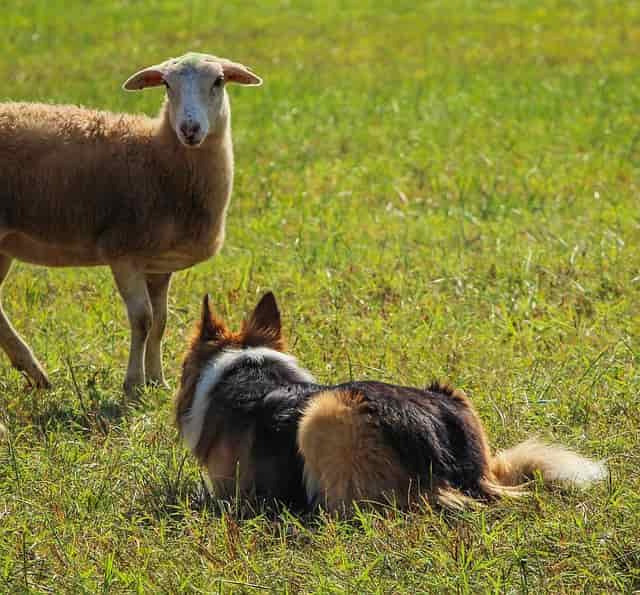
Free Range Support
Many farmers choose to let their chickens roam free-range, which can be beneficial for the chickens’ health and well-being. However, free-range chickens can also be more vulnerable to predators. Border Collies can be trained to support free-range chickens by keeping them within designated areas and preventing them from running off. They can also help to identify and deter predators, allowing the chickens to roam more safely.
Interactions with Other Pets
Border Collies and Cats
Border Collies can get along well with cats, but it largely depends on the individual dog’s temperament and training. If a Border Collie has a strong prey drive, they may see cats as something to chase and herd. However, with proper socialization and training, Border Collies can learn to coexist peacefully with cats.
It’s important to supervise interactions between Border Collies and cats, especially during the initial introduction period. Keep the dog on a leash and reward them for calm behavior around the cat. If the dog shows any signs of aggression or excessive interest in the cat, separate them and try again later.
Border Collies and Kids
Border Collies can make great family pets, but it’s important to teach kids how to interact with them appropriately. Border Collies have a strong herding instinct, which means they may try to herd children by nipping at their heels or barking. It’s important to teach kids not to run away from the dog, as this can trigger their herding behavior.
Instead, encourage kids to stand still and calmly pet the dog. Teach them to avoid rough play and to give the dog space when needed. With proper training and socialization, Border Collies can be great companions for kids.
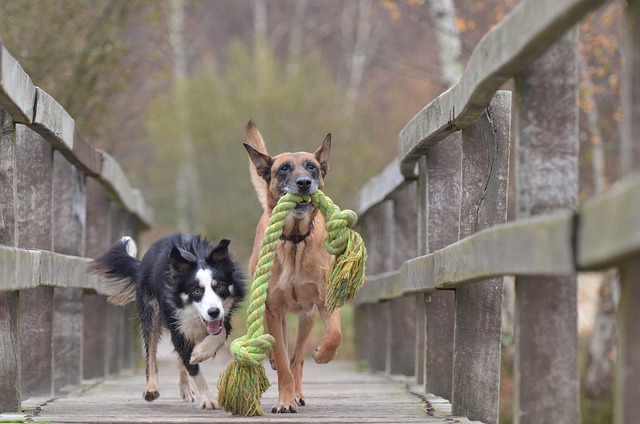
Alternative Breeds for Chicken Herding
If you’re looking for an alternative to Border Collies for herding chickens, there are several other breeds that may be a good fit for you. Here are some of the top options to consider:
Great Pyrenees
Great Pyrenees are large, gentle dogs that are known for their protective nature. They were originally bred to guard livestock, including chickens, and they can be excellent at keeping predators away from your flock. However, they may not have the same herding instincts as Border Collies, so they may not be as effective at keeping your chickens in a specific area.
Anatolian Shepherd
Like Great Pyrenees, Anatolian Shepherds are large, protective dogs that were bred to guard livestock. They are known for their loyalty and bravery, and they can be effective at keeping predators away from your chickens. However, they may not have the same herding instincts as Border Collies, so they may not be as effective at keeping your chickens in a specific area.
English Sheepdog
English Sheepdogs, also known as Old English Sheepdogs, are medium-sized dogs that were originally bred for herding sheep. They are intelligent and loyal dogs that can be trained to herd chickens as well. However, they may not be as effective at keeping predators away from your flock as some of the larger breeds.
Australian Shepherd
Australian Shepherds are medium-sized dogs that were originally bred for herding livestock, including chickens. They are intelligent and energetic dogs that can be excellent at keeping your chickens in a specific area. However, they may not be as effective at keeping predators away from your flock as some of the larger breeds.
Shetland Sheepdog
Shetland Sheepdogs, also known as Shelties, are small dogs that were originally bred for herding sheep. They are intelligent and trainable dogs that can be effective at herding chickens as well. However, they may not have the same herding instincts as Border Collies, so they may not be as effective at keeping your chickens in a specific area.
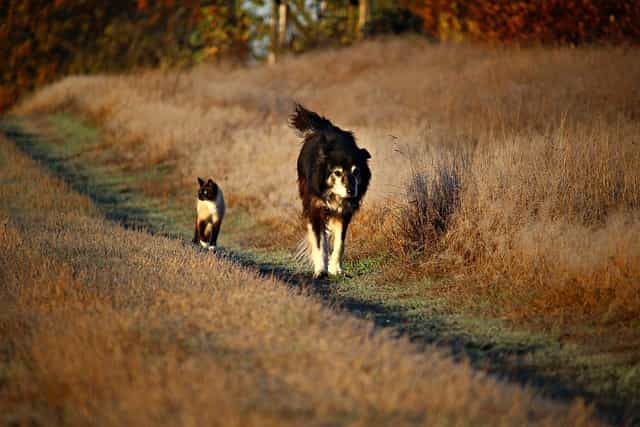
Frequently Asked Questions
Can Collies protect chickens?
Yes, Border Collies can protect chickens. They are known for their herding instincts and can be trained to protect a flock of chickens from predators. However, it’s important to note that not all Border Collies have the same level of protective instincts, so it’s important to choose a dog that has been specifically trained for this purpose.
What breed of dog protects chickens?
There are many breeds of dogs that can protect chickens, including Great Pyrenees, Anatolian Shepherds, and Australian Shepherds. It’s important to choose a dog that has been specifically trained for this purpose and has the right temperament for the job.
What dogs do Border Collies not get along with?
Border Collies can get along with most dogs, but they may not do well with dominant or aggressive breeds. It’s important to introduce Border Collies to other dogs slowly and under close supervision to ensure that they get along well.
Are German Shepherds good with chickens?
German Shepherds can be good with chickens if they are properly trained and socialized. However, they have a strong prey drive and may view chickens as prey. It’s important to introduce German Shepherds to chickens slowly and under close supervision to ensure that they do not harm the birds.
Are Golden Retrievers good with chickens?
Golden Retrievers can be good with chickens if they are properly trained and socialized. However, they have a strong prey drive and may view chickens as prey. It’s important to introduce Golden Retrievers to chickens slowly and under close supervision to ensure that they do not harm the birds.
Are Bernedoodles good with chickens?
Bernedoodles can be good with chickens if they are properly trained and socialized. However, they have a strong prey drive and may view chickens as prey. It’s important to introduce Bernedoodles to chickens slowly and under close supervision to ensure that they do not harm the birds.